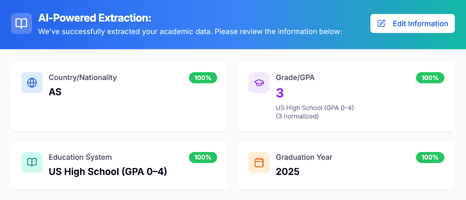Find your program
How To Create Recommendation Letters?


A letter of reference from teachers or mentors is crucial for students applying to universities or jobs. This letter serves as a character witness, representing the student to the evaluating university or corporation. When a student receives an honest and positive reference, it significantly enhances their chances of standing out among other candidates.
Admissions officials, especially at private four-year institutions, emphasize a holistic approach to the application process. Rather than solely focusing on academics and test scores, they aim to understand the student as a "whole individual," considering various aspects of their personality. Since face-to-face interactions are often limited, recommendation letters, along with the student's essay, play a pivotal role in highlighting their intellectual and personal attributes. These letters offer valuable insights into the student's character and help showcase their potential beyond the confines of test scores and academic achievements.
Recommendation letters from professors, especially those well-acquainted with their students' work, play a crucial role in the application process. A strong letter that demonstrates unwavering support and highlights a student's outstanding academic and personal qualities can greatly influence their chances of admission to a specific institution. These recommendation letters come in various formats and styles. Below, you'll find a collection of sample letters and templates to assist students in gaining an understanding of their structure and content.

How to Obtain a Powerful Letter of Recommendation
Although each recommendation letter pertains to a different student with diverse interests, they share essential characteristics. First and foremost, these letters should exude enthusiasm and passion. Lecturers must make it evident that they are genuinely inspired by their students and are committed to supporting their educational journey. While providing instances to back their judgments is crucial, it's essential not to overdo it. The use of specific examples and anecdotes to support the assessment is essential in creating compelling letters. Personal information can add intrigue and memorability to the recommendation.
Furthermore, instructors should discuss their students' talents and academic strengths, painting a complete picture that admissions staff seek. Demonstrating a strong belief in the students' potential to succeed in the future is vital. It is crucial for teachers to blend all these elements cohesively in their letters, and students can assist them by providing relevant raw resources.
When choosing a teacher to write their recommendation letter, students should opt for someone familiar with their character, with anecdotes and insights to share. To make the letter more customized and in sync with the rest of the application, students can provide professors with specific guidelines outlining what they would like to be included.
It is acceptable for recommenders to decide whether to share their letters with students, but fostering an open, two-way dialogue when a student makes such a request is important. This collaborative approach allows students and professors to develop an informative, passionate, and targeted recommendation letter to be submitted to universities.

What is the purpose of a cover letter?
A cover letter is a concise, one-page professional document that accompanies your resume and explains your interest in a specific career. Usually comprising 3 or 4 paragraphs, the cover letter highlights your skills and expertise relevant to the organization. It serves as a complement to your resume, offering the hiring manager additional insights.
In your cover letter, you should articulate the reasons for your interest in the position and the organization. While some employers require a cover letter, others consider it optional, and a few may not request one. Nonetheless, a well-crafted cover letter can demonstrate your competence and organizational skills to recruiters.
Sample of a short recommendation letter
Dear Mr. Collins,
I am pleased to offer my enthusiastic support for Janet Lerner's internship application. My acquaintance with Janet dates back to last autumn when she participated in my Spatial and Temporal Dynamic Meteorology course.
Janet's performance in my class was exceptional, as she achieved the highest possible mark. However, her true potential and character extend far beyond what has been demonstrated so far. Janet is an avid learner and a unique individual who approaches her studies with unwavering dedication, all while maintaining a cheerful disposition. Her passion for meteorology never hinders her commitment to other aspects of her life, reflecting her scientific humanism and genuine concern for others.
It comes as no surprise that Janet is highly regarded and admired by her colleagues. In a challenging in-class forecasting competition, Janet's superior understanding of atmospheric processes allowed her to secure first place with ease. She also holds a leadership position in the College Weather Service, an organization operated by students, delivering weather information to radio stations in five states.
I can personally attest to Janet's ability to handle difficult circumstances with ease. During a tour she conducted at the Weather Station, I witnessed her interact with families and young girls, confidently and politely addressing their meteorology-related queries.
In a nutshell, Janet stands head and shoulders above her peers with her exemplary moral standards and extensive knowledge of meteorology. I hold her in the highest regard as a potential intern.
Regards,
James Trevor
Educator in the Field of Meteorology
.webp)


























.webp)





